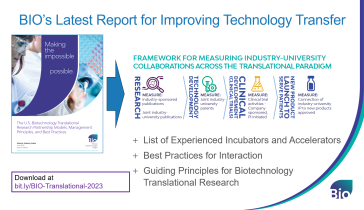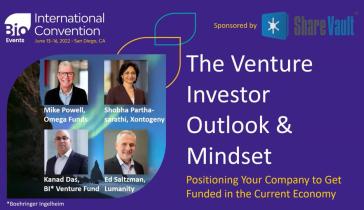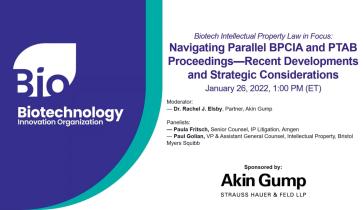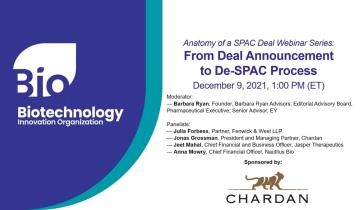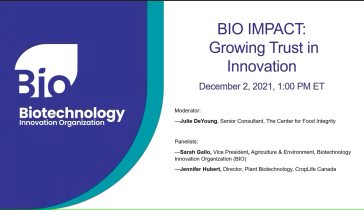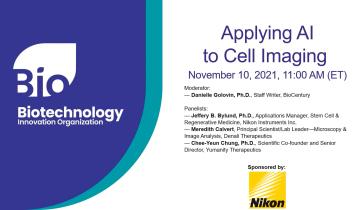March 17, 2026
Speakers: Tamy Dalal, Jeff Vallerga, Jose Arellano, Clark Chandler, Brandon Clough, Lori Cotsack, Matt Curry , Sarah Glazier, Greg Hassan, Steve Joseph, Carrie Kleinle, Ric Kunnert, Gaby Levey, Alina Mencias, Tina Nuthulaganti, Dalton Speelman , Jim Tilton, Dave Tucker
BIO Savings Week connects life science companies with the lab and business solutions available through their BIO or state life science association membership. Across three days, you will hear directly from BIO Business Solutions' preferred providers about programs tailored to…

March 26, 2026
Speakers: Ryan Lowry, Sydney Williams, Nicholas Zuccaro
Join Sydney Williams, BIO Senior Manager, Exhibit Sales & Systems, along with members of the BIO Partnering team, for a webinar to walk exhibitors through the tools needed to plan for the 2026 BIO International Convention. Exhibitors will be provided with the resources…
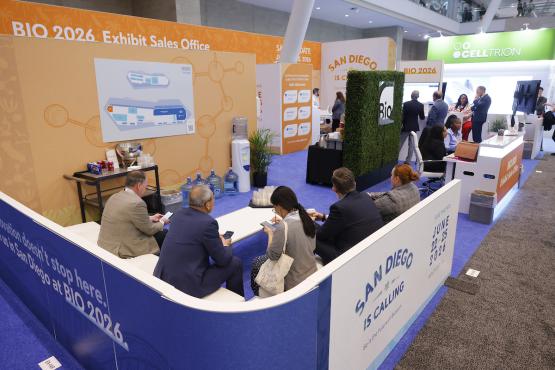
April 7, 2026
Speakers: Mackensie Vernetti
BIO is excited to announce BIO Partnering for Oncology, a new partnering opportunity designed to accelerate collaboration and dealmaking across the oncology ecosystem. This partnering event is connecting innovators, investors and companies advancing breakthroughs in cancer…


Get ready to take your business development strategy from the boardroom to the beach at the BIO Investment & Growth Summit, happening March 2–3, 2026, in sunny Miami Beach!
Before you pack your sunglasses, join this lively walkthrough of the BIO Partnering™ system—your essential tool for connecting with investors, innovators, and dealmakers who can take your company to the next level.
In this session, you’ll learn how to:
- Craft a standout partnering profile that catches attention
- Search for and identify high-value partners and investors
- Send targeted meeting requests that lead to real opportunities
- Manage your schedule so you can focus on making deals and maybe catch a few rays)
- Don’t miss this chance to ride the wave of opportunity and arrive in Miami ready to make the most of every meeting.

In September 2025, the U.S. FDA launched a major enforcement campaign targeting direct-to-consumer (DTC) pharmaceutical advertising that misleads patients or downplays risks. Following a September 2025 presidential directive, the agency announced hundreds of enforcement actions—including over 100 cease-and-desist letters—signaling a zero-tolerance stance toward unbalanced or deceptive ads. While most of the letters focused on DTC content, FDA also sent letters for health care provider (HCP) promotion. The message: Government scrutiny and enforcement will significantly increase for biopharma as well as medical device promotion. This webinar includes regulatory compliance and drug advertising compliance experts who dissect the FDA’s mindset and ways to proactively mitigate concerns.
In this webinar, panelists:
– Drill down into FDA’s renewed enforcement areas
– Dissect the implications of increased enforcement on the industry
– Identify specific cases that are clear examples for company concern
– Isolate the key principles for avoiding violations and demonstrating good faith

Wrap up the week with an executive overview of BIO Business Solutions and a deep dive with our flagship partner, Avantor. Learn how the program delivers ongoing value and discover exclusive offers and procurement strategies available to BIO members.
Agenda Overview:
- BIO Business Solutions Overview by BIO Vice President of Business Development, Jeff Vallerga
- Avantor – Learn how to drive purchasing efficiency and lab performance with one of the life science industry's leading suppliers. From everyday consumables to capital equipment, discover how member companies leverage Avantor’s flagship program for exclusive pricing, custom sourcing support, and supply chain optimization.
- Q&A
- Closing Remarks & Next Steps
BIO Business Solutions® is the largest cost-savings program for the life sciences industry, leveraging the collective buying power of thousands of member companies to deliver exclusive pricing on lab supplies, insurance, office essentials, and more, all at no additional cost to members.

Join Thermo Fisher Scientific for an exclusive webinar introducing a transformative approach to biologics development and clinical scale-up. Their "Path to IND for Biologics" method accelerates the journey from DNA to IND/IMPD submission and first-in-human clinical trials in as few as 9 months. Dr. Elena Gontarz, a leading expert in the biologics industry, will guide you through this innovative process, leveraging AI/ML, transposase technology, and integrated solutions during the session: "Path to IND for Biologics: From DNA to First-in-Human in 9 Months." Following the presentation, Dr. Gontarz will answer audience questions and discuss how these novel strategies can streamline the development of complex biologics, such as Fc-fusion proteins and bispecific antibodies, driving them swiftly from development to commercialization.
Get a sneak peek on this novel platform
Terms and Conditions: Titer levels provided are estimates based on third party results and may vary depending on molecule type or other factors. Timeline from DNA to drug product and start of clinical trials for all path to IND for biologics options may vary depending on molecule type or other factors and are estimates to be finalized after third party cell line development dates are available and confirmed. 9-month timeline will incur additional risk.
Learn more about Dr. Elena Gontarz's expertise and background:

View this webinar for an in-depth exploration of today's complex global market landscape. This panel will address the challenges of launching new therapies in multiple countries, focusing on early decision points for risk mitigation and maximizing supply chain resiliency. Discover how Cencora's global capabilities and flexible solutions can strengthen supply chain resilience amidst evolving challenges.
Moderator: Sandra Anderson, Senior Vice President Commercialization, Cencora
Panelists:
- Glenn Pauly, Chief Commercial Officer, Alzheon
- Graham Goodrich, Chief Commercial Officer, Apnimed
- Leigh Shultz, PhD, Associate Vice President & International Head of Trade Channel Strategy & Enablement, Merck & Co.
- Kevin McDermott, Vice President International Commercialization, Cencora
- Tom Doyle, Head of U.S. Commercial Solutions, Cencora

More than $4B of deals between biopharma companies and AI specialists were announced last year. Similar to the massive quality leap from GPT-2 to GPT-4 and the record-breaking consumer adoption rates of AI tools, that same exponential progress and uptake is coming to biotech AI. 2024 may bring the first one-trillion-parameter protein language model. Companies are already using AI to program, as opposed to discover, antibodies. This level of opportunity and change brings with it urgency—— companies need to rethink from the ground up how their R&D should work to compete in a new era defined by the intersection of biology, data, and AI.
In this webinar, learn how companies are updating their approach to R&D, with a focus on:
- AI-Ready Data: Improving generation of high-quality biomedical data to support AI model building and model tuning
- AI-Enabled Scientists: Integrating the right models directly into scientists’ workflows for everyday use
- Scalability: Making performance, speed, privacy, and cost tradeoffs for deployment of AI, and connecting the wet and dry labs

With the majority of biological studies conducted in academic settings but nearly all innovative new drug clinical trials sponsored by industry, improving translational research success rates for commercialization is critical to bringing new treatments to patients. Surveys of academic tech transfer offices and the biopharma industry executives working on such alliances cite as obstacles two highly controllable factors: disagreement about alliance performance metrics and misalignment of deal terms priorities. This panel discusses best practices for removing such obstacles to accelerate more promising ideas into clinical development for patients.
BIO's updated 2023 report, "U.S. Biotechnology Translational Research: Partnership Models, Management Principles, and Best Practices," is available for download at the link below. The webinar also summarizes major findings from that BIO report as context for the panel discussion and audience Q&A.

The Cell and Gene Therapy (CGT) Science Series is a quarterly seminar series focused on scientific topics related to cell and gene therapy products. The CGT Science Series is intended to foster scientific exchange between the Biotechnology Innovation Organization (BIO), the American Society of Cell & Gene Therapy (ASGCT), and Center for Biologics Evaluation and Research (CBER) review staff on a variety of topics that span the CGT product lifecycle. The seminars are planned as 60-minute virtual webinars featuring a speaker from one of the three organizations. The CGT Science Series will enable a deep dive into a specific technical and/or scientific area. Topics in the series may include but are not limited to, nonclinical, CMC, clinical, or post-market phases of development related to CGT product lifecycle.
Moderator:
– Anne-Virginie Eggimann, Tessera
Opening Remarks:
– Cartier Esham, Senior Advisor, Biotechnology Innovation Organization (BIO)
Speaker:
– Jing Liao, Director, Vector Development and Operations, Alexion Pharmaceuticals

- Opening Remarks: Overview and Department of Defense Priorities
- Investing at the Speed of Need: Novel Technologies and Platforms to Accelerate Drug Development
The US Government invests in biomedical research in many ways, including direct funding of some critical R&D areas for diagnostics, vaccines, and therapeutics that could strengthen biodefense preparedness. This BIO-hosted webinar details for the biotechnology corporate and academic community the many new and previously available sources of capital, as well as the processes for applying for funding, from the US Department of Defense.
The Department of Defense (DoD) is continuously engaging in efforts to protect the warfighter from a broad array of threats. Preparing for and responding to these threats requires key partnerships with the industry to develop vaccines, therapeutics, and diagnostics that are designed specifically to meet the unique needs of the warfighter in various situations. Many of the investments made through these partnerships also support broader applications of key biotechnologies for other unmet healthcare needs. This important webinar represents an opportunity for BIO members and the whole biotechnology community to get an update about the priorities and programs within the DoD and the ways companies can work with the Agency on their priorities.

- Repurposing and Redirecting: An Alternate Approach to Accelerating Medical Countermeasures
The US Government invests in biomedical research in many ways, including direct funding of some critical R&D areas for diagnostics, vaccines, and therapeutics that could strengthen biodefense preparedness. This BIO-hosted webinar details for the biotechnology corporate and academic community the many new and previously available sources of capital, as well as the processes for applying for funding, from the US Department of Defense.
The Department of Defense (DoD) is continuously engaging in efforts to protect the warfighter from a broad array of threats. Preparing for and responding to these threats requires key partnerships with the industry to develop vaccines, therapeutics, and diagnostics that are designed specifically to meet the unique needs of the warfighter in various situations. Many of the investments made through these partnerships also support broader applications of key biotechnologies for other unmet healthcare needs. This important webinar represents an opportunity for BIO members and the whole biotechnology community to get an update about the priorities and programs within the DoD and the ways companies can work with the Agency on their priorities.

How to Work with the Department of Defense
The US Government invests in biomedical research in many ways, including direct funding of some critical R&D areas for diagnostics, vaccines, and therapeutics that could strengthen biodefense preparedness. This BIO-hosted webinar details for the biotechnology corporate and academic community the many new and previously available sources of capital, as well as the processes for applying for funding, from the US Department of Defense.
The Department of Defense (DoD) is continuously engaging in efforts to protect the warfighter from a broad array of threats. Preparing for and responding to these threats requires key partnerships with the industry to develop vaccines, therapeutics, and diagnostics that are designed specifically to meet the unique needs of the warfighter in various situations. Many of the investments made through these partnerships also support broader applications of key biotechnologies for other unmet healthcare needs. This important webinar represents an opportunity for BIO members and the whole biotechnology community to get an update about the priorities and programs within the DoD and the ways companies can work with the Agency on their priorities.

The Biotechnology Innovation Organization (BIO) presents this webinar to hear from top Big Pharma professionals in search & evaluation licensing and venture investing about what it takes to get them interested in a new technology. We look at their recent deals and ask why they got done, explore the challenges and learn what makes a technology exciting. Then we dive into a discussion on what tech/modalities and platforms are seen as exciting. Finally, we get advice for those biotechs that are ready for licensing or investment.

The Biotechnology Innovation Organization (BIO) hosts this candid chat with three major investors from our biotechnology community. Gain valuable insights and be ready to ace pitching world-changing solutions in the face of a down-trending market at the 2022 BIO International Convention, June 13-16, in San Diego, California.
For more details visit http://bio.org/convention
Introduction from Mike Liccardo, VP Corporate Development and CFO, ShareVault

Biotech Intellectual Property Law in Focus: Webinar Series
Navigating Parallel BPCIA and PTAB Proceedings – Recent Developments and Strategic Considerations
This panel hosted by the Biotechnology Innovation Organization (BIO) discusses relevant case law and trends in BPCIA litigation and related PTAB proceedings, followed by a “roundtable” on the factors that may influence litigation strategy, early case resolution, and market entry.

A private biotech that announces a definitive agreement with a SPAC jumps into the public investor spotlight and faces that attention with fewer guardrails than the IPO process, plus a need to transform board, investor, and regulatory relations. Given that most SPAC merger deals also involve follow-on PIPE investment rounds or other transactions, the full fundraising benefits of the deal strategy require a smooth de-SPAC process that a private biotech would never have encountered before. View this webinar to learn best practices for navigating from SPAC deal announcement through de-SPAC process to regular life managing a publicly traded company.

Innovation flourishes when science and consumer values are aligned and complement one another. Regulatory approaches towards innovative products cannot exist in isolation. They should be supported by credible transparency measures. A proactive approach to transparency stands to build trust and foster an inclusive environment to address our most pressing societal, nutritional, and environmental concerns. This webinar will explore the meaningful – and sometimes unexpected- actions and partnerships that are growing trust in the innovation ecosystem and delivering access to innovations that benefit people and the planet.

New algorithms and optical system improvements are expanding the frontier of cell imaging quality. Artificial intelligence techniques enable better visualization of cellular mechanisms in a wide number of applications and across multiple scientific disciplines, including advancing neurological research. View this Biotechnology Innovation Organization (BIO) webinar as it highlights how AI and imaging are being used to improve our understanding of complex and notoriously intractable disorders such as Alzheimer’s, Dementia, and related diseases. Learn from the following imaging and therapeutic development experts as they answer audience questions during the session.







